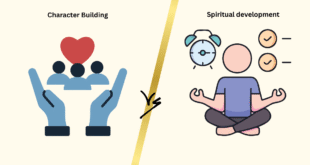In today’s rapidly evolving educational landscape, many parents, educators and communities face a central question: Which schooling pathway best supports the holistic growth of children: academic, moral, spiritual and social?
On one hand we have conventional schooling (public, private non-faith-based schools) and on the other a faith-based alternative: Islamic schooling. This article explores the key differences, the strengths and weaknesses, and offers guidance on how to choose wisely.
What is Conventional Schooling?
Conventional schooling or traditional schooling is broadly used here to mean the mainstream school model in many countries: state-run or privately-run schools that do not necessarily place a religious/faith identity at their core.
They follow national or regionally mandated curricula, tend to focus on academic subjects (languages, mathematics, science, etc.), and socialize students to civic, economic and social life in a secular or multi-faith context.
Key features of conventional schooling include:
- A standardized curriculum prescribed by educational authorities.
- Teacher and assessment systems aligned with national standards.
- A focus on academic attainment, exams, measurable outcomes.
- Socialization across diverse religious, cultural and socio-economic groups.
- Limited or optional religious instruction (depending on country context).
Advantages typically cited for conventional schooling: broad subject exposure, well-recognized credentials, access to mainstream higher education and employment pathways, integration into pluralistic society.
What is Islamic Schooling?
When we speak of “Islamic schooling” we refer to schools whose mission, curriculum, pedagogy and ethos are deliberately shaped by Islamic values, teachings and worldview. These schools seek to integrate both secular and religious knowledge, in a manner consistent with Islam, and to nurture not only the mind but the heart and soul of learners.
An article on “Why Islamic Schooling?” highlights several distinguishing features:
- An Islamic worldview: students learn to see and interpret the world through faith-based lenses.
- Moral and character formation: emphasis on honesty, integrity, compassion, service to others.
- Spiritual development: inclusion of Quran, Hadith, worship, remembrance of Allah, and reflective practice.
- A community and fellowship environment grounded in the faith tradition.
In other words, Islamic schooling aims for Tarbiyah (nurturing/education in a holistic sense) rather than just tuition or certification.
Another source describes “Islamic pedagogy” — the philosophy of education rooted in Islamic tradition — emphasizing concepts such as fitrah (innate human nature), Amanah (trust/responsibility), ta’dib (refinement of character), tazkiya (spiritual purification) and niyyah (intention) among others.
Thus Islamic schooling is not merely adding “Islamic Studies” as an extra subject; it is a comprehensive paradigm about purpose, value, and method of education.
Why Compare Them?
It is important to compare Islamic schooling vs conventional schooling because many families (especially Muslim families) are trying to reconcile two goals: academic excellence (to compete in the modern world) and faith-based moral/spiritual development. They wonder:
- Will Islamic schooling compromise academic rigor or worldly preparedness?
- Will conventional schooling ignore values/spiritual formation?
- What trade-offs exist and how to best navigate them?
By comparing we can help families make informed decisions aligned with their values, context, resources and expectations.
Key Areas of Comparison
We will compare across several dimensions:
- Purpose and Philosophy of Education
- Curriculum and Subject Integration
- Learning Environment & Culture
- Teacher Role and Pedagogy
- Outcomes: Academic & Character
- Strengths & Challenges of Each
- Practical Guidance for Parents/Students
-
Purpose and Philosophy
Conventional Schooling:
Typically emphasizes preparation for further education/ employment, socialization into wider society, development of intellectual skills, critical thinking and often citizenship values. The goal is measurable achievement (grades, exams, credentials).
Islamic Schooling:
while also caring about academic success, places a particular emphasis on who the learner is becoming morally upright, spiritually aware, socially responsible, and intellectually capable through an Islamic lens.
For example, Islamic pedagogy emphasizes “the education of the soul” as paramount.
Therefore, in an Islamic school the purpose may be framed as: “To develop students who know Allah, act with integrity, contribute positively to their community and excel in this world and the next.” The dual aim of dunya (world) and deen (religion) is prominent.
-
Curriculum and Subject Integration
Conventional schools:
Curriculum is usually divided into discrete subjects (mathematics, science, language, social studies). Religious/moral education may be a small part (depending on country) and often optional. The worldview across subjects may be secular or plural.
Islamic schools:
In many cases, the curriculum seeks to integrate Islamic values across subjects — not only in a dedicated “Islamic Studies” class, but also by framing other subjects (science, history, literature) in an Islamic worldview.
For example, one description of an Islamic online school shows that mathematics problems incorporate Islamic historical examples; science lessons may explore how creation is a sign of Allah; literature may reinforce moral teachings.
The challenge here is balancing rigorous academic standards with religious integration. Some research emphasizes the need for a balanced approach to integration of Islamic and secular knowledge.
-
Learning Environment & Culture
Conventional schools vary widely but tend to operate in diverse multi-faith/multi-cultural settings. The environment is shaped by national/state policies, and there may not be a heavy faith-based community ethos unless the school is private and faith-based.
Islamic schools aim for a culture where faith practices are normalized: e.g., daily prayers, Quran recitation, ethical codes, halal food, modesty norms, community service, and peer group oriented around the faith. The community and fellowship component is important.
The peer group and environment are significant — positive role models, moral behavior, and identity reinforcement. Research shows that parent involvement, religious motivation and school environment positively influence the quality of Islamic schooling.
-
Teacher Role and Pedagogy
Conventional schooling: Teachers primarily deliver content aligned with the standard curriculum, often emphasizing instruction, assessments, measurable outcomes, subject expertise. Pedagogical innovation (interactive learning, critical thinking) may vary by school.
Islamic schooling: The teacher’s role includes both subject expert and moral/spiritual mentor. According to the notion of Islamic pedagogy, teaching is infused with values: the way we teach matters (not just what we teach).
For instance, educators are expected to nurture self-reflection (Mahasabha), excellence (Ihsan), intention (Niya) in students. This may lead to more holistic teaching approaches. Of course, the reality depends on the school’s implementation.
-
Outcomes: Academic & Character
Academic outcomes: Conventional schools often pride themselves on test scores, university admissions, global competencies. Islamic schools aim to deliver academic excellence as well, but also commit to character and spirituality.
Research shows that Islamic school systems that integrate both secular and religious knowledge can provide academically competent students with strong identity and moral grounding.
For example, a study in Indonesia found that Islamic education contributes positive externalities at individual and community levels. (Digital Library Adelaide)
Research on Islamic schooling quality also points to the fact that when parents are actively involved and schools focus on quality, outcomes improve. (ERIC)
Character outcomes: A key claimed strength of Islamic schooling is moral formation, sense of service, ethical conduct, community‐oriented mindset.
For example, the “Why Islamic Schooling?” article lists moral formation, spiritual development and service‐mindedness as central. (Isaahome)
Thus an Islamic school may produce graduates who are academically capable and morally grounded.
-
Strengths and Challenges of Each
Strengths of Conventional Schooling
- Broad subject exposure and access to mainstream higher education pathways.
- Standardized curriculum and widespread recognition of credentials.
- Diverse student body and exposure to multi-cultural/multi-faith environments (which can build social adaptability).
- A potentially strong focus on innovation, technology, global skills (depending on school).
Challenges of Conventional Schooling
- Potentially weaker emphasis on moral/spiritual formation, faith identity or character development (unless the school makes deliberate efforts).
- Risk of values drift — children may adopt peer/consumer culture, materialism, etc.
- Sometimes subject matter may conflict with faith values (for Muslim families), leading to tension.
- Less integration of faith into all aspects of schooling; faith may remain separate or marginalized.
Strengths of Islamic Schooling
- Strong identity formation: students grow in a faith-based community with shared values.
- Integration of faith and learning: the student’s worldview is coherent with the school’s mission.
- Character and moral formation are central — not just an after-thought.
- Potentially supportive peer environment with positive role models.
- The holistic approach: mind, body, spirit are all considered (tarbiya).
Challenges of Islamic Schooling
- Balancing academic rigor with faith integration: some Islamic schools might focus heavily on religious content but lag in academic performance or global competency if not managed well.
- Curriculum overload: trying to cover both full secular curriculum + Islamic curriculum can increase workload on students/teachers.
- Market/recognition issues: Depending on country, some Islamic schools might struggle with accreditation or external recognition. One source notes that Islamic schools in Western contexts can fall into simply replicating the public school model with “Islamic” labels. (Home)
- Resource constraints: Teacher training, facilities, modern pedagogies may be less developed in some faith-based schools.
- Potential social “bubble”: Less exposure to non-Muslim peers or diverse worldviews might limit adaptability (though this depends highly on school policy).
-
Practical Guidance for Parents / Students
Choosing between Islamic schooling and conventional schooling is not simply a matter of one being “better” than the other — it depends on context, goals, school quality, family values and resources. Here are guiding questions and tips:
-
Clarify Your Priorities
- What are your primary aims? Academic excellence, faith/spiritual growth, character formation, global exposure?
- How important is it for you that your child is in a faith-immersive environment?
- Are you comfortable with a school that emphasizes the faith dimension heavily (and how that integrates with secular subjects)?
- Assess the Specific School (Islamic or conventional)
- For an Islamic school: Does it have strong academic credentials? Does it integrate secular and religious knowledge effectively? What is the teacher training and student outcome record?
- For a conventional school: What is the moral/spiritual climate? Are values taught explicitly? Is the community culture supportive of your child’s faith?
- Accreditation, teacher qualifications, resources, class sizes, technology, extra-curricular offerings.
- Check Curriculum Integration (for Islamic Schools)
- Are Islamic values integrated across subjects (or only confined to “Islamic studies” class)?
- Is the curriculum balanced: secular subjects meet national/international standards, while faith subjects are meaningful?
- Is there flexibility and responsiveness to 21st century learning? Some research emphasizes the need for Islamic education to adapt to modern contexts.
- Evaluate Environment & Community
- How is peer culture? Are students encouraged toward character, service, ethical action?
- How does the school support spiritual development (prayers, Quran, reflection) and academic development side by side?
- How connected are parents, teachers, and community in supporting the school’s mission? Research shows parental involvement is crucial in improving Islamic schooling quality. (Eurasian Journal of Educational Research)
- Consider Long-Term Outcomes
- Will the school prepare your child for both worldly success and spiritual responsibility?
- What pathways exist beyond school: higher education, vocational options, community leadership?
- How will the child develop resilience, identity, critical thinking, social adaptability?
- Hybrid/Complementary Approaches
- Some families choose a conventional school but supplement with strong Islamic moral/spiritual education at home (or weekend/madrasa programs).
- Others choose Islamic schools but ensure exposure to broader social/cultural settings (extra-curricular, community service, inter-school engagements).
- A blended model may offer the best of both: strong academics + strong faith formation + social adaptability.
Special Considerations in Muslim‐Majority and Minority Contexts
The decision between Islamic and conventional schooling may take special contours depending on whether the family is in a Muslim-majority country (like Pakistan, Indonesia) or a Muslim-minority context (Europe, North America). For example:
- In minority contexts, Islamic schooling may provide critical identity reinforcement, peer support, and protection from negative peer influences. As one study of Muslim homeschooling emphasized: avoid negative peer influence, provide a controlled atmosphere, and balance deen and dunya. (Journal of Integrated Sciences)
- In Muslim-majority countries, the challenge may be ensuring that Islamic schools meet modern academic standards and remain globally competitive (as noted in research about balancing religious and secular knowledge in Pakistani schools).
- In either context, families should ask: are we preparing our children to engage positively with wider society and not be isolated?
A Balanced View: Complementarity, Not Dichotomy
It’s worth emphasizing that “Islamic schooling vs conventional schooling” should not be framed as a rigid binary where one is good and the other bad. A more nuanced perspective is:
- An Islamic school that neglects academic rigor may under-serve a student.
- A conventional school that neglects moral/spiritual development may under-serve a student.
- The ideal is an education that is both academically strong and morally/spiritually grounded.
- Many Islamic schools aim for exactly that: “well-rounded education that integrates academic excellence … with Islamic values.” (Isaahome)
- Many conventional schools today are also trying to embed character education, values, citizen-ship, moral reasoning, even though they may not be faith-based.
Thus the real challenge is less “faith vs secular” and more “quality vs neglect”, “holistic vs fragmented”, “values vs vacuity”.
Why Families Choose Islamic Schooling
Let’s summarize some of the major motivating reasons families might opt for Islamic schooling:
- Desire for a strong Islamic identity and moral environment.
- Concern about negative peer influences, value drift, exposure to conflicting ideologies.
- Wanting an environment where faith is not sidelined but central.
- Wanting integration of deen and dunya: academic success and spiritual formation.
- Community/cohort effect: being with peers who share their faith and values.
- Peace of mind regarding environment, ethical culture, and purpose of schooling.
Research supports several of these motivations. For example, in a review of Islamic schooling quality, it was found that parent’s religious motivation and concern about school environment are positively associated with school quality. (ERIC) Also, the study “Why Islamic Schooling?” highlights commitment to spiritual/moral growth. (Isaahome)
Why Families Choose Conventional Schooling
Likewise, there are valid reasons to choose conventional schooling:
- Strong academic programs, recognized credentials, pathways into higher education and employment.
- Exposure to diverse peers from different backgrounds, which can foster social skills, tolerance, and real-world readiness.
- Possibly lower cost (especially in public schools) or more resources in established institutions.
- Flexibility and choice: sometimes conventional schools offer broader curriculum options, extracurriculars, advanced technology.
- For some families, faith is nurtured at home while schooling is separate — they may feel able to provide values themselves and focus on academic strength in school.
Realistic Challenges: What to Ask
When evaluating any school (Islamic or conventional) ask the following:
- What is the student-teacher ratio? What are teachers’ qualifications (academic + moral/faith orientation)?
- What are the outcomes: exam results, university admission rates, student satisfaction, alumni success?
- How is character formation embedded (not just declared) — how is behaviour, community service, spirituality, citizenship taught and assessed?
- How is faith integration (for Islamic school) or values/ethics (for conventional school) operationalised?
- Does the school overload students trying to cover both academic and faith subjects? Are students properly supported?
- How is the curriculum kept up-to-date with 21st century demands (digital literacy, critical thinking, global awareness)? In Islamic education research this need is noted: “…adjustments to 21st-century learning, … integrate conventional and modern learning methods”. (IJERD)
- What is the cost/financial model, and does it match your budget and expectations?
- How does the school involve parents and community? Parent involvement is especially important for Islamic schooling quality. (ERIC)
Case Study: Blended Approach
An interesting model is described in Bangladesh: where an institution combines Islamic and international/international curriculum (Cambridge) while embedding Islamic values. For example, the school begins with Quran recitation and du’a, integrates smart-classrooms with spiritual guidance, involves parents, and still produces good academic outcomes. (EIS Dhaka)
This kind of blended approach suggests that the dichotomy (“either/or”) is increasingly being replaced by “both/and” models: faith-based + global competence.
Summary Table
| Dimension | Conventional Schooling | Islamic Schooling |
| Purpose / Philosophy | Focus on academic/preparation for employment & citizenship | Focus on holistic development (mind, body, soul), faith + world |
| Curriculum | Standardized secular subjects, religion optional | Integration of secular + religious knowledge, Islamic worldview |
| Learning Environment | Diverse peers, exposure to plural contexts | Faith-centred peer group, community identity, moral culture |
| Teacher Role | Subject specialist, academic assessor | Subject specialist + faith/character mentor |
| Outcomes Emphasis | Exam results, further education, employment | Academic success and moral/spiritual formation, service |
| Strengths | Broad exposure, credential recognition, diversity | Strong identity, moral formation, faith integration |
| Challenges | Potential values gap, secular drift, faith conflicts | Balancing academics + faith, resource constraints, accreditation |
| Ideal Fit | Families prioritizing academic exposure, diversity, mainstream pathways | Families prioritizing faith identity, moral formation, integrated learning |
Final Thoughts
When the question is “Islamic schooling vs conventional schooling”, the ultimate answer is: It depends. There is no one-size-fits-all. What matters most is the quality of the school, alignment with family values, the mix of academic competence and character formation, and the broader ecosystem (home, community, peer group).
For Muslim families in particular, an Islamic school can provide an environment where faith and learning reinforce each other, supporting children not just to succeed academically but to flourish as morally conscious, spiritually grounded leaders. But this should not come at the expense of academic standards or global readiness.
Similarly, a conventional school can succeed spectacularly if the family, home and community fill the role of faith/character formation, and the school offers a vibrant, values-conscious environment.
Ultimately, the best schooling choice is intentional: a choice made with clarity of purpose, awareness of trade-offs, and ongoing engagement from parents, educators and students alike.
Call to Action
If you are a parent or educator exploring schooling options, here are next steps:
- Visit and tour schools (both Islamic and conventional); ask pointed questions about curriculum integration, values, outcomes.
- Talk to current students and parents about their lived experience.
- Evaluate how well the school fosters Tarbiyah (growth of the whole person) rather than only tuition.
- Monitor your child’s progress: academically, morally, socially, spiritually.
- Engage with the school community: parents’ matter.
- Stay flexible: schooling choice isn’t irreversible — you can adjust if necessary.
By choosing wisely and engaging proactively, you can help your child navigate the world with knowledge, character, and faith.
 Edutarbiyah English Blog of Parenting and Tarbiyah
Edutarbiyah English Blog of Parenting and Tarbiyah



